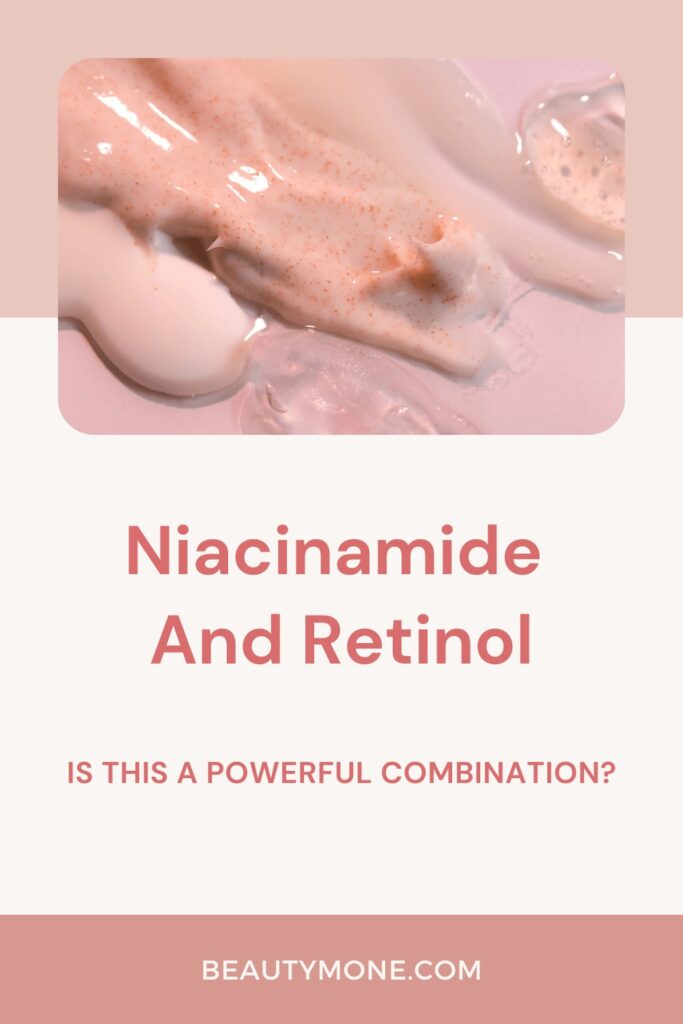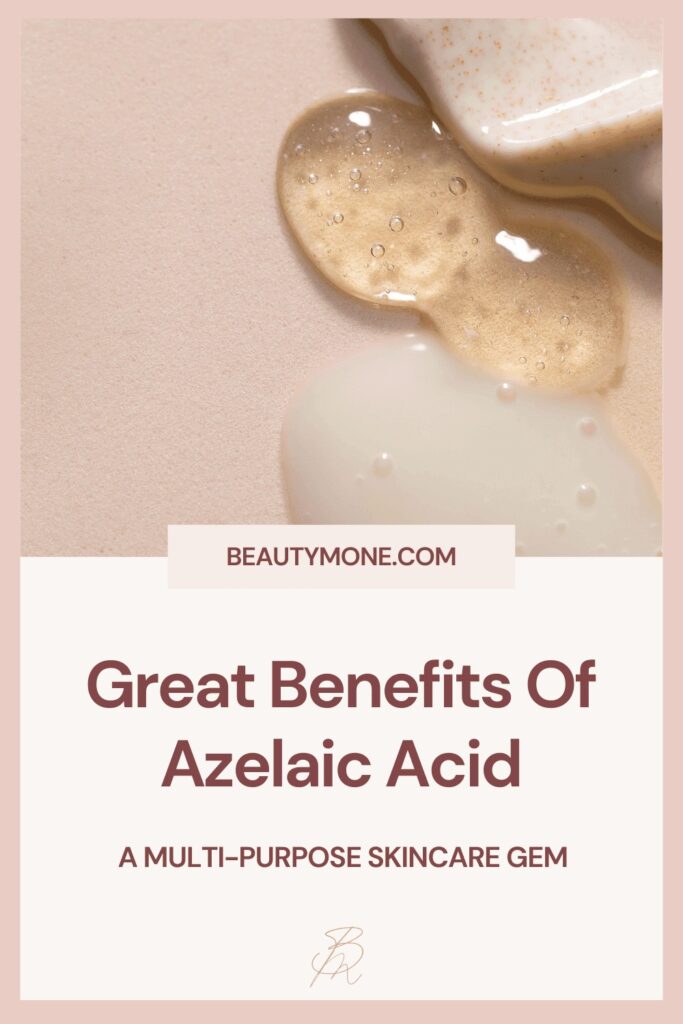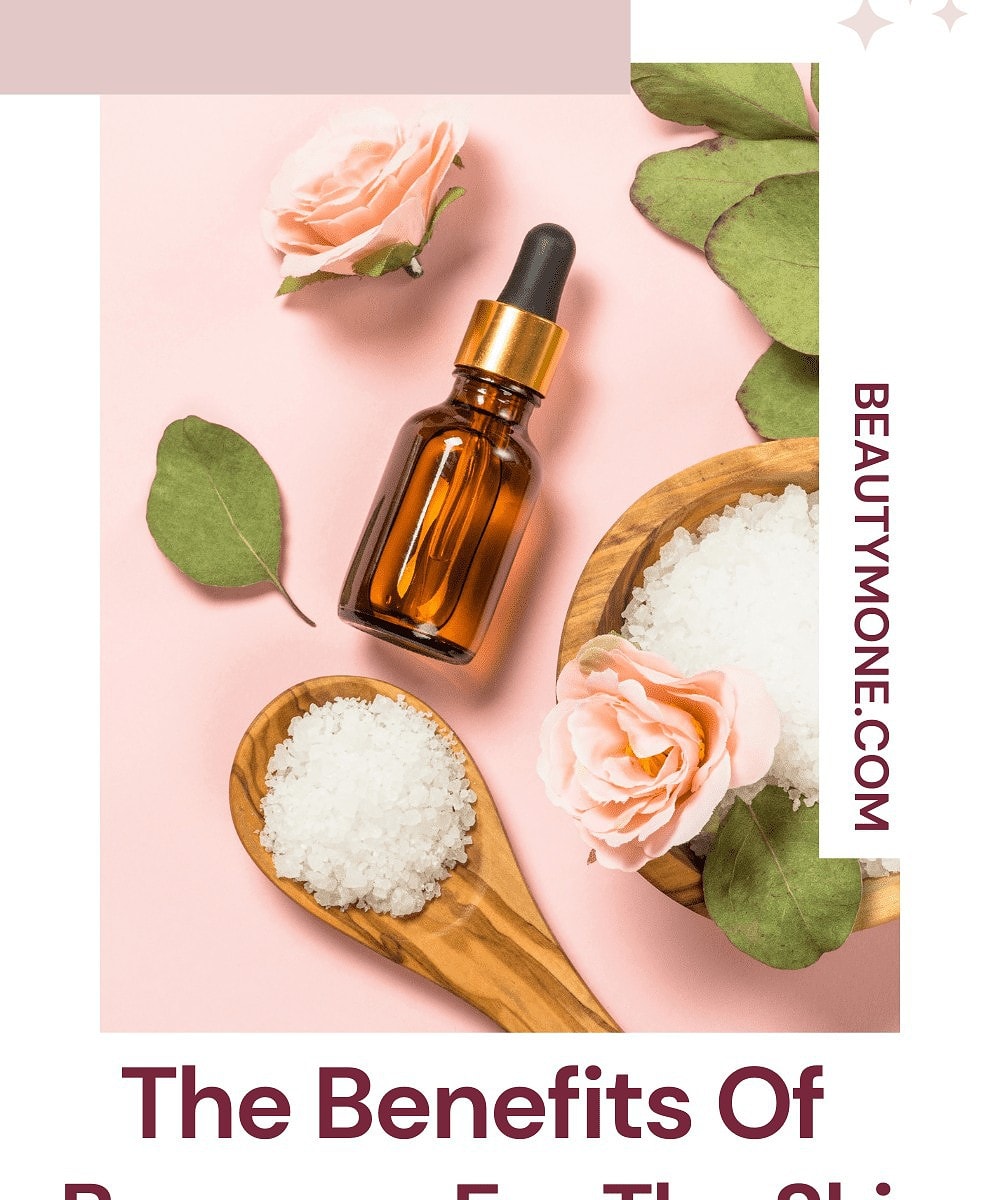
When it comes to skincare, there is no one-size-fits-all solution. Different skin types require different ingredients to maintain a healthy and glowing complexion. But with so many skincare ingredients on the market, it can be difficult to know which ingredients are best for your skin.
In this article, we’ll explore the benefits of Beeswax for the skin, what it is, if it has any side effects, and how you can implement it into your skincare routine. This post will help you determine if Beeswax is a suitable ingredient for your skin type.
From natural oils to powerful antioxidants, you’ll learn which properties and beeswax skin benefits can help you achieve a clear and radiant complexion.
Overview of the Benefits of Beeswax for the Skin
Beeswax is a natural wax produced by honey bees. It has many benefits for the skin because it is an occlusive moisturizer that helps lock in moisture and hydrates the skin. Other benefits for the skin are:
- Anti-Bacterial
- Anti-Inflammatory
- Anti-Aging
Let’s dive deeper into the benefits of beeswax for the skin.
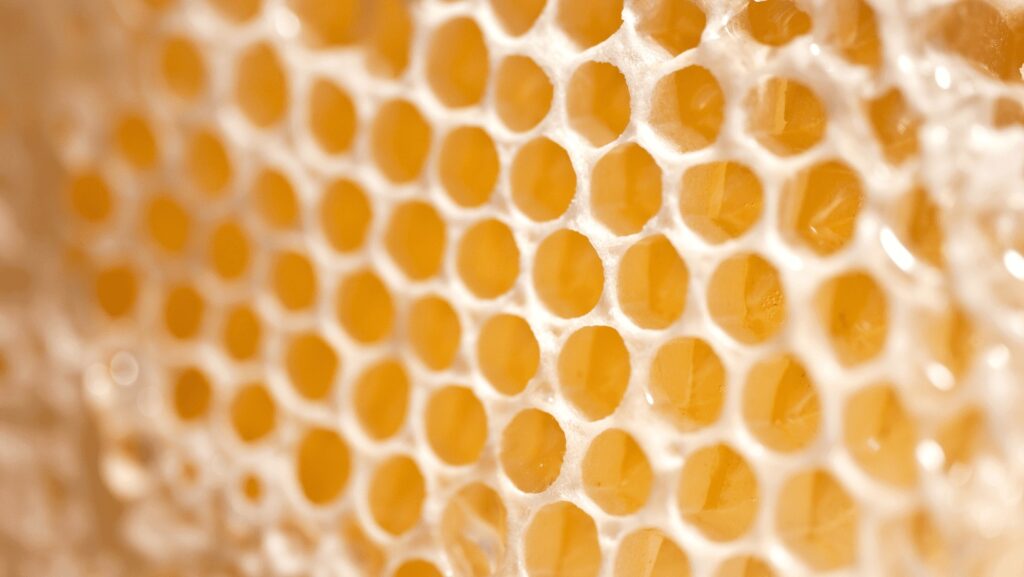
What Is Beeswax
Beeswax is a natural wax that is produced by honeybees. It is secreted from four pairs of glands on the underside of their abdomens and used to build honeycomb structures for their hives.
Beeswax is used in many beauty products and has many uses in skincare, including providing moisture, protection, and texture to products. It is commonly used in lip balms, soaps, lotions, creams, and other skincare products to provide a protective barrier while allowing the skin to breathe naturally.
Additionally, it can aid in healing wounds and irritations while providing a soothing effect on the skin.
Properties Of Beeswax
Beeswax is a natural emulsifier, binding oil and water. It is also highly stable and, therefore, a popular ingredient in makeup and skincare.
The biological properties of these products are related to the flavonoids they contain, like chrysin, apigenin, kaempferol, quercetin, galangin, pinocembrin, or naringenin. Several pharmacological activities of phenolic acids and flavonoids, and also 10-hydroxy-trans-2-decanoic acid, which is present in royal jelly, have been reported [1].
Royal jelly has many pharmacological activities: antibiotic, anti-inflammatory, anti-allergenic, tonic, and anti-aging. Honey, propolis, and pollen are used to heal burn wounds and possess numerous functional properties such as: antibacterial, anti-inflammatory, antioxidant, disinfectant, antifungal, and antiviral[1].
Benefits Of Beeswax For The Skin
As mentioned above, the benefits of Beeswax for the skin are diverse and may sound attractive. Let me explain precisely what these benefits mean and what they will do for your skin. Here are the main skin benefits of beeswax:
Anti-Bacterial
Beeswax forms a protective barrier on the skin that can help prevent infection and keep out dirt and other impurities.
Beeswax has lubricating and softening activities and reduces transepidermal water loss from the skin. Sterols, also components of intercellular space, provide these characteristics of beeswax.
Squalene, 10-hydroxy-trans-2-decanoic acid, and flavonoids (chrysin) provide antiseptic properties to this product and protect the skin against pathogenic microorganisms[2].
Anti-Inflammatory
Beeswax also has anti-inflammatory properties, which can help to soothe redness and irritation. Additionally, it can help protect the skin from environmental stressors like wind and cold temperatures.
Beeswax is also characterized by several therapeutic properties of great interest to us; it is thought to be particularly effective in healing bruises, inflammation, and burns[3].
On top of that, a mixture of honey, beeswax, and olive oil inhibits the growth of Staphylococcus aureus and Candida albicans[4]. This means beeswax is anti-inflammatory and can prevent certain conditions from growing.
Anti-Aging
Beeswax has antioxidant properties that can help fight free radicals and reduce signs of aging. Beeswax constitutes a protective barrier against many external factors by forming a film on the skin’s surface.
β-carotene in beeswax is a valuable source of vitamin A, into which it is converted. Vitamin A delays collagen degradation and stimulates mitotic division in the epidermis, thus leading to sooner regeneration of the skin after damage[5].
Potential Side Effects Of Beeswax
Even though the chances are small that Beeswax will give you any side effects, I want to make you aware of its potential side effects so that if you notice any of the summed reactions below, you can immediately stop using Beeswax.
The most common potential side effects of using beeswax on the skin are irritation, redness, and itchiness. If beeswax is used as a skincare ingredient in a product that contains other ingredients too, it could also cause an allergic reaction. A patch test before using any new product on your skin is recommended.
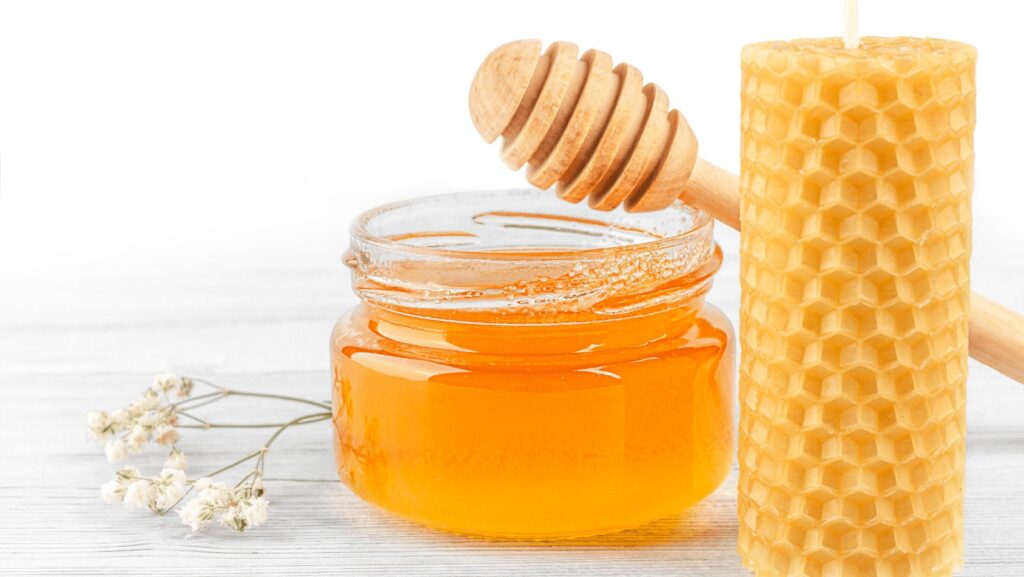
Does Beeswax Clog Pores?
Beeswax does not clog pores. This is based on the comedogenic rating, in which Beeswax is rated a 2 – This means that it has a moderately low chance of clogging pores.
Comedogenic Rating
Common ingredients in skincare products are rated on a scale of 0–5. The higher the number is, the higher the chances are that your pores may get clogged.
Generally, values of 2 and below are unlikely to cause clogged pores. So products containing ingredients with these scores are considered non-comedogenic.
What Does Non-Comedogenic Mean?
To put it simply, non-comedogenic products are designed and formulated, so they don’t clog your skin’s pores. That means the ingredients in non-comedogenic skincare products are light and gentle and allow your skin to breathe.
Often, hydrating and revitalizing products contain synthetic ingredients or heavy oils that can block your pores, causing breakouts or excessive oil production. While heavy oil products have their place in the beauty world, they can be harmful to anyone with sensitive or acne-prone skin, especially after prolonged use.
Non-comedogenic products aid hydration and protect your skin’s natural barrier without clogging your pores. The best non-comedogenic ingredients can help kill pathogens on your skin, protect your skin from UVA and UVB rays, and reduce excess oil.
Beeswax is non-comedogenic, meaning that it doesn’t clog pores.
Sources of Beeswax
There are a couple of sources to find Beeswax in so that the application method can differ. It’s your choice in which way you want to use Beeswax, obviously. Here are the most well-known methods that are proven to work:
Direct Application
Beeswax can be purchased from many online retailers, including Amazon, Etsy, and eBay. Some local beekeepers may also sell beeswax directly to buyers. Additionally, many health food stores and some craft stores also carry beeswax. You can DIY and create your skincare products with beeswax or use it directly on the skin.
Skincare Products
Many unique skincare products on the market already contain beeswax, so you don’t have to DIY to have the same benefits of beeswax for the skin. Here are some amazing products that contain beeswax:
- Sunday Riley C.E.O. 15% Vitamin C Rapid Flash Brightening Serum
- Espa Refining Skin Polish
- Farmacy Honey Butter Beeswax Lip Balm
- Elemis Pro-Collagen Cleansing Balm
- Burt’s Bees Beeswax Lip Balm
See even more products here:
How To Use Beeswax On The Skin
Beeswax can be used in a variety of ways in a skincare routine. Here are some ways to use beeswax in your routine + some ways to create your beeswax products (but as I said, you can also purchase them, so you don’t have to DIY).
1. As a barrier cream: Mix beeswax with coconut oil and shea butter or cocoa butter to create a barrier cream to protect skin from the elements. Apply it to the face and body as needed.
2. As a lip balm: Create your own lip balm and protection from chapped lips by combining beeswax, coconut oil, and honey in a double boiler on low to medium heat until melted together, then pour into small containers or tins for easy application.
3. As an exfoliant: Combine beeswax with sugar or salt to create an exfoliating scrub that helps remove dead skin cells and help skin retain moisture. Gently massage onto wet skin for best results.
4. As an ointment: Make an ointment by melting together equal parts of beeswax and olive oil on low heat until melted completely, then add essential oils like lavender or peppermint for added benefits before applying to the skin as needed.
Final Thoughts On The Benefits Of Beeswax For Skin
You may want to add beeswax into your skincare routine if you’re looking for an ingredient with anti-bacterial, anti-inflammatory, and anti-aging properties that are great for people with sensitive skin types who want to hydrate the skin.
The most common potential side effects of using beeswax on the skin are irritation, redness, and itchiness. Doing a patch test before using any new product on your skin is recommended. If you notice a reaction in any way, stop using beeswax immediately.
article sources
To keep my blog posts accurate and trustworthy, I rely on peer-reviewed studies, articles from reputable academic institutions, and quotes from certified healthcare professionals to back my claims. For this post, I used the following sources:
- Kurek-Górecka A, Górecki M, Rzepecka-Stojko A, Balwierz R, Stojko J. Bee Products in Dermatology and Skin Care. Molecules. 2020 Jan 28;25(3):556. doi: 10.3390/molecules25030556. PMID: 32012913; PMCID: PMC7036894.
- Kurek-Górecka A, Górecki M, Rzepecka-Stojko A, Balwierz R, Stojko J. Bee Products in Dermatology and Skin Care. Molecules. 2020 Jan 28;25(3):556. doi: 10.3390/molecules25030556. PMID: 32012913; PMCID: PMC7036894.
- Fratini F, Cilia G, Turchi B, Felicioli A. Beeswax: A minireview of its antimicrobial activity and its application in medicine. Asian Pac J Trop Med. 2016 Sep;9(9):839-843. doi: 10.1016/j.apjtm.2016.07.003. Epub 2016 Jul 26. PMID: 27633295.
- Al-Waili NS. Mixture of honey, beeswax, and olive oil inhibits growth of Staphylococcus aureus and Candida albicans. Arch Med Res. 2005 Jan-Feb;36(1):10-3. doi: 10.1016/j.arcmed.2004.10.002. PMID: 15777988.
- Kurek-Górecka A, Górecki M, Rzepecka-Stojko A, Balwierz R, Stojko J. Bee Products in Dermatology and Skin Care. Molecules. 2020 Jan 28;25(3):556. doi: 10.3390/molecules25030556. PMID: 32012913; PMCID: PMC7036894.


